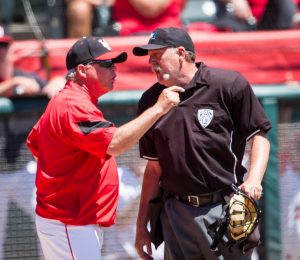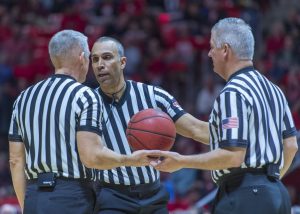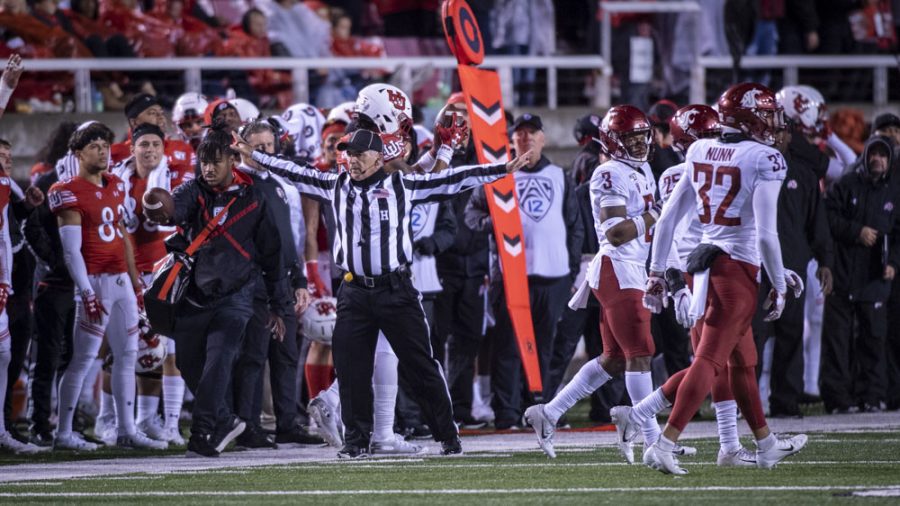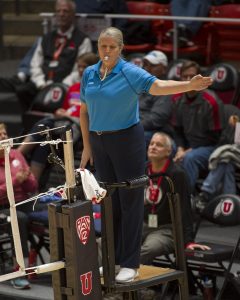Is the Pac-12’s Transparency a Good Thing?
A referee calls the catch by University of Utah sophomore wide receiver Solomon Enis (21) over Washington State defense no good during an NCAA Football game at Rice Eccles Stadium in Salt Lake City, Utah on Saturday, Sept. 28, 2019. (Photo by Kiffer Creveling | The Daily Utah Chronicle)
October 17, 2019
On Sept. 14, 2019, the Arizona State University football team won a tightly contested game against Michigan State University, 10-7. The result was far from the biggest story to come out of the game. It appeared Michigan State had tied the game by kicking a 42-yard field goal as time expired.
After review, it was shown that Michigan State had 12 players on the field at the time of the field goal, causing a five-yard penalty and requiring Michigan State to attempt a 47-yard field goal. Matt Coghlin, Michigan State’s kicker, lined up for the field goal, but this time he missed it. The game was over. Arizona State won.

Pac-12 Transparency
In a statement released by the Pac-12 Conference the following day, Sept. 15, they stated:
“After the five-yard penalty was assessed that moved the ball to the 29-yard line, Michigan State again attempted a field goal with 0:06 remaining that was no good as time expired. However, there should have been a foul called for leaping. An Arizona State defensive player took a running start and leapt over the kicking team’s line in an attempt to block the kick. In the process, he leapt into the frame of the body of an opponent. The penalty would have been 15 yards from the previous spot and an automatic first down.”
The penalty would have given Michigan State the ball between the 14- and 15-yard line with one untimed down. Michigan State would then have the chance to kick a 32-yard field goal. The thing about this statement is that it’s hypothetical. The referees missed the calls. The game was over. The Pac-12 cannot go back and change the outcome of the game. So, what is the point?
“The above statement and clarification is provided through the Pac-12 Conference’s new football officiating communications protocol,” said the Pac-12. “The protocol is designed to increase transparency and public comment around significant calls that meet certain criteria.”
The criteria are a call or no-call resulting in the end of the game, a call that involves significant error of “officiating mechanics,” the false interpretation of rules, or other extraordinary circumstances. If a call or no-call meets the criteria, the Pac-12 office will release a statement no later than the end of the day following the call in question. The statement generally states that officials will be held accountable for the error and subject to a disciplinary process.
Speculation
Besides being transparent, what exactly does this protocol and the corresponding Pac-12 report accomplish? The conference will not go back and retroactively overturn the result of a game based on a missed call. This is because there is no way that they can accurately predict what the result would have been.
For example, the leaping penalty, if called in real time, would have resulted in one untimed down for Michigan State from the Arizona State 14-yard line. This would mean Coghlin would have an attempt at a 32-yard field goal. Coghlin had already missed field goals from 31 and 47 yards, one of which was the field goal attempt with the leaping penalty. The only make he had on the day was from 42 yards, but was called back for the 12 men on the field penalty mentioned earlier. He had been far from automatic. He missed a shorter field goal than the one he would have attempted after the penalty was assessed.

The Human Element
I’m not saying he would have missed, but I am trying to illustrate that there is nothing that can be done after the game to change the result. Bad calls are a part of sports. Fans of sports know that there is a human aspect of sports. People are inherently imperfect. This imperfection is part of what some fans love. Fans cheer for players who make mistakes and are imperfect.
Often, fans are often seen complaining about the amount of video reviews that stop football games on a regular basis. These reviews create long delays to the run of play. Fans don’t want penalties to be reviewable, thus adding a review process for penalties will hurt how watchable a football game is.
Fans know there will be missed calls. When missed calls happen, fans will complain about it for a few days, then move on. The Pac-12 putting out a report about missed calls does completely the opposite. Fans of the team on the wrong end of a missed call get frenzied, claiming they were robbed. The Pac-12 should still run the reports, discipline their officials as they see fit, but keep it internal and not publicly release a report. The Pac-12 transparency is causing more harm than any good it can provide.









